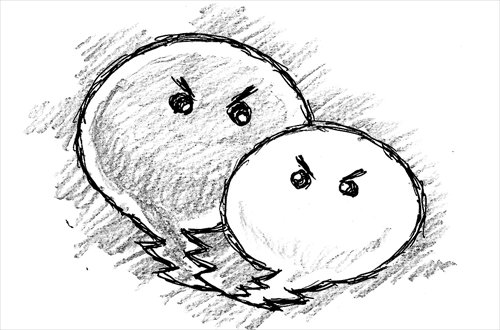Social media offers poor arena for academic battles

Illustration: Peter C. Espina/GT
When Hao Xianghe, a post-graduate first-year of Renmin University of China majoring in history, posted a few academically judgmental and personally abusive words against two well-known historians on his social media account, he probably didn't think they could lead to an inglorious breakoff with his professor.
Hao's tutor Sun Jiazhou, a professor of history at the university, was infuriated by Hao's criticisms against two of his fellow academics, saying in a statement that Hao's words are "groundless mockery" and he immediately bashed this "unscrupulous pupil." Besides, he unilaterally announced a breakoff of this mentoring relationship.
Hao responded to Sun's condemnation the next day, trying to explain his words and vindicate himself, but withdrew the statement soon after. The university intervened finally and promised to deal with the crisis "according to regulations."
Intense argument is commonplace in academia. Be they in the same fields or even times, scholars with different opinions over various questions are inclined to be engaged in wrangling, which, however, sometimes goes beyond academic debates and turns out to be personal attacks.
For example, Isaac Newton's famous "If I have seen further, it is by standing on the shoulders of giants" has taken as a sarcastic remark directed at the short stature of Robert Hooke, a British natural philosopher and Newton's lifelong rival.
Still, cases where a tutor breaks up with his or her pupil are very rare in Chinese academia, which is why this Hao-Sun dispute has drawn a wide controversial attention. In the old age of mentoring, being expelled by the tutor is the severest punishment for a student. The traditional mentorship values loyalty and cliqueism as the founding principles of an academic society, a result which has often produced a situation where the mediocre promote their fellow mediocrities in turn. Among the ousted, some blazed new trails by depending on intelligence and creativity, while the others just end up in fruitless exile.
Despite university regulations, which have the final say in deciding whether the tutor-pupil relationship should remain or not, it seems that nobody is a winner in the brawl. Hao, a young man who has barely begun his studies, has paid a price for his frivolous remarks, and Sun has to suffer pungent if not entirely fair criticism for "awakening the long-abandoned academic sectarianism," and "bullying like an authoritarian in violations of free speech and academic liberalism."
The squabble, triggered by misunderstandings in the first place, is the latest victim of the fragmentation of information. Discussions on the platform of social media are lightweight social gestures, including retweets, favorites and follows, which are usually oversimplified and random response to fragmented information, not well-thought-out actions.
Therefore, judgmental remarks on social media without sufficient proof are rife with the academia. Most discussions are simplistic declarations of contentions, which could trigger overbearing and fruitless debates.
When Hua Luogeng, an outstanding mathematician, found out in the 1930s, before he had become famous, that the solution to a technical problem proposed by fellow mathematician Su Jiaju was wrong, he published his rebuttal in an influential Chinese journal. The accurately and solidly proven paper was his first significant achievement, which led him to further education at Tsinghua University.
It is still early to shift academic exploration and discussion into social media, as spontaneous pros and cons are only distractions for serious academic studies. Tested knowledge and wisdom can't find much room in 140 characters.
The author is a Global Times reporter. liuzhun@globaltimes.com.cn